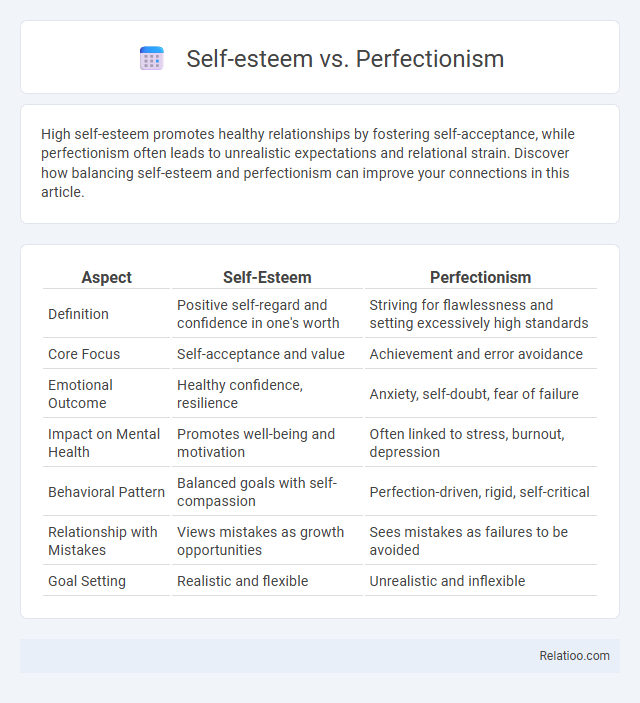High self-esteem promotes healthy relationships by fostering self-acceptance, while perfectionism often leads to unrealistic expectations and relational strain. Discover how balancing self-esteem and perfectionism can improve your connections in this article.
Table of Comparison
| Aspect | Self-Esteem | Perfectionism |
|---|---|---|
| Definition | Positive self-regard and confidence in one's worth | Striving for flawlessness and setting excessively high standards |
| Core Focus | Self-acceptance and value | Achievement and error avoidance |
| Emotional Outcome | Healthy confidence, resilience | Anxiety, self-doubt, fear of failure |
| Impact on Mental Health | Promotes well-being and motivation | Often linked to stress, burnout, depression |
| Behavioral Pattern | Balanced goals with self-compassion | Perfection-driven, rigid, self-critical |
| Relationship with Mistakes | Views mistakes as growth opportunities | Sees mistakes as failures to be avoided |
| Goal Setting | Realistic and flexible | Unrealistic and inflexible |
Understanding Self-Esteem: A Foundation for Wellbeing
Understanding self-esteem is crucial for your overall wellbeing, as it reflects how you value and perceive yourself independently of external achievements. Unlike perfectionism, which often involves setting unattainable standards and self-criticism, healthy self-esteem fosters self-acceptance and resilience. Building strong self-esteem allows you to manage expectations effectively, reducing the negative impact of perfectionist tendencies on mental health.
What is Perfectionism? Key Traits and Behaviors
Perfectionism is characterized by an intense striving for flawlessness, accompanied by critical self-evaluations and concerns about others' expectations. Key traits include setting unrealistically high standards, fear of making mistakes, and persistent dissatisfaction with one's performance despite achievements. These behaviors often lead to procrastination, anxiety, and reduced self-esteem due to the constant pressure to meet impossible ideals.
Self-Esteem vs Perfectionism: Core Differences
Self-esteem reflects an individual's overall sense of self-worth and confidence, while perfectionism involves setting excessively high standards and often harsh self-criticism when those standards aren't met. High self-esteem fosters resilience and healthy self-acceptance, whereas perfectionism can lead to anxiety, fear of failure, and decreased self-esteem due to relentless self-judgment. Understanding the core difference reveals that self-esteem is about valuing oneself unconditionally, whereas perfectionism hinges on conditional acceptance based on flawlessness.
The Psychology Behind Self-Esteem and Perfectionism
Self-esteem reflects an individual's overall sense of self-worth, while perfectionism involves setting excessively high standards and striving for flawlessness, often leading to self-criticism. The psychology behind self-esteem and perfectionism reveals that unhealthy perfectionism can undermine self-esteem by fostering fear of failure and chronic dissatisfaction. Cognitive-behavioral theories suggest that addressing maladaptive perfectionist beliefs is crucial for improving self-esteem and enhancing psychological well-being.
How Perfectionism Impacts Self-Esteem
Perfectionism often leads to unrealistic standards that negatively impact self-esteem by fostering chronic dissatisfaction and fear of failure. Individuals with high perfectionism tend to equate self-worth with flawless performance, resulting in increased stress and diminished confidence when these impossible goals are not met. This cycle creates a persistent internal conflict, where self-esteem is contingent on meeting unattainable ideals rather than recognizing inherent value.
Signs You’re Struggling With Low Self-Esteem or Perfectionism
Struggling with low self-esteem often manifests as persistent self-doubt, harsh self-criticism, and a fear of failure that impacts Your confidence and decision-making. Perfectionism, characterized by setting unrealistically high standards and an intense fear of making mistakes, can lead to chronic stress and dissatisfaction despite accomplishments. Recognizing signs such as procrastination, excessive self-monitoring, and avoidance of challenges can help identify whether low self-esteem or perfectionism is undermining Your well-being.
The Effects on Mental Health: Anxiety, Depression, and Burnout
Low self-esteem often increases vulnerability to anxiety, depression, and burnout by fostering negative self-perception and self-doubt. Perfectionism, especially maladaptive perfectionism, exacerbates mental health challenges by creating unrealistic standards that lead to chronic stress and feelings of failure. Understanding the impact of these traits on your mental health can guide you toward healthier coping strategies and emotional resilience.
Cultivating Healthy Self-Esteem: Strategies and Tips
Cultivating healthy self-esteem involves recognizing your inherent worth without tying it to flawless achievements, differentiating it from the relentless pursuit of perfectionism. Strategies such as practicing self-compassion, setting realistic goals, and embracing mistakes as growth opportunities help balance your desire for excellence with acceptance. Building this mindset strengthens resilience and fosters a positive self-view that supports personal fulfillment beyond perfectionistic standards.
Overcoming Perfectionism: Practical Approaches
Overcoming perfectionism involves recognizing the unrealistic standards set by perfectionist tendencies and gradually embracing self-compassion to boost self-esteem. Practical approaches include setting achievable goals, practicing mindfulness to reduce anxiety, and challenging negative self-talk to break the cycle of perfectionist behavior. Building resilience through positive affirmations and focusing on progress rather than perfection helps foster a healthier self-image and sustainable personal growth.
Building Balance: Finding Growth Without Self-Criticism
Balancing self-esteem and perfectionism involves cultivating a mindset where growth is prioritized over flawless outcomes, enabling individuals to embrace progress without harsh self-criticism. High self-esteem supports resilience and self-acceptance, reducing the negative impact of perfectionistic tendencies that often lead to anxiety and decreased motivation. Developing this balance fosters healthier psychological well-being by promoting realistic goal-setting and recognizing personal achievements beyond imperfections.

Infographic: Self-esteem vs Perfectionism
 relatioo.com
relatioo.com